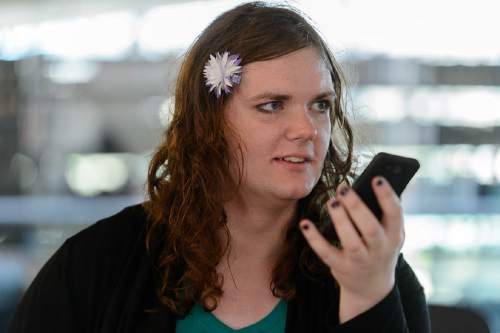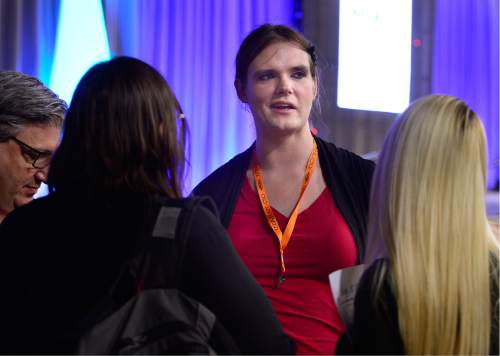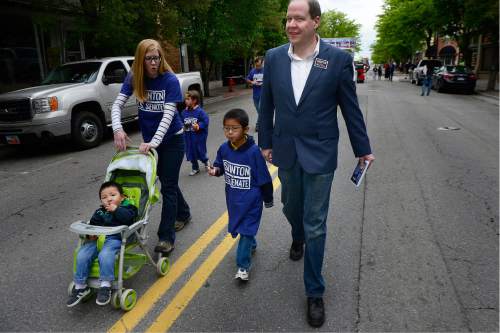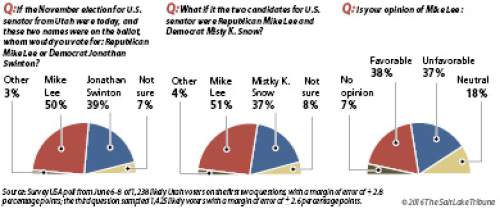This is an archived article that was published on sltrib.com in 2016, and information in the article may be outdated. It is provided only for personal research purposes and may not be reprinted.
Sen. Mike Lee's Democratic challenger will either be a marriage counselor eager to find common ground with Republicans or a grocery store cashier and transgender woman who is running as a strong progressive.
Either way, Lee has a decisive advantage, according to a new Salt Lake Tribune-Hinckley Institute of Politics poll of likely November voters.
If the general election were held now, Lee would beat Jonathan Swinton, the marriage counselor, 50 percent to 39 percent. And if he faced Misty K. Snow, the store cashier, Lee would prevail 51 percent to 37 percent.
"No matter who wins the Democratic primary later this month, Utah voters will have a clear choice to make this November," said Lee, one of the nation's most conservative senators. "I am confident that my reform agenda will continue to resonate with Utahns and we will win the general election."
Similarly, his challengers, a pair of first-time candidates with little history within Utah's Democratic Party, saw positives in the poll numbers leading up to their June 28 primary showdown.
Swinton notes that Lee hovers just around 50 percent, even though his two challengers are relatively unknown.
"I would bet a lot of that poll is a reflection of people's dissatisfaction with Mike Lee," he said. "I'm encouraged because it shows some vulnerability."
The poll, conducted by SurveyUSA, also asked registered voters about their opinion of Lee, who is seeking his second term.
It found that 38 percent of respondents said they had a favorable view of the senator, while 37 percent had an unfavorable view. Seven percent had no opinion, and 18 percent said "neutral."
In the Tribune-Hinckley poll, Gov. Gary Herbert was the only major Utah officeholder with decidedly more favorable than unfavorable responses, coming in at 48 percent to 24 percent.
Eliminating Lee's 11 percentage point edge, Swinton said, is "a very achievable goal." He had a slightly better showing than Snow, who trails Lee by 14 percentage points largely because Swinton performed better with voters 65 and older.
The survey shows there's no indication one Democrat is more electable than the other, Snow said, which she believes undercuts one of Swinton's primary attacks. He has argued his more centrist campaign is more likely to attract crossover voters.
Snow has countered that the election is about who turns out more voters, and she believes she'll drum up more enthusiasm among Utah's Democrats.
She argued that the primary contest will help the eventual nominee because he or she will be better known.
A UtahPolicy poll, released Monday, shows how much work Snow and Swinton have to increase their visibility. It found that 65 percent of respondents didn't have a preference, while 19 percent backed Snow and 17 percent supported Swinton, a true tossup. The poll conducted by Dan Jones and Associates found Snow with a 37 percent to 24 percent advantage among likely Democratic voters, though that group included just 118 people, resulting in a margin of error of 9 percentage points.
The Democratic candidates held a debate last week in St. George, where they displayed their competing strategies in a polite give-and-take, though they had some sharp criticism of Lee.
Snow called Lee "a fairly loathsome figure who really doesn't do a good job representing Utah."
She said Donald Trump's poor showing among Utah Republicans gives Democrats an opportunity, and the best way to take advantage of that is by drawing "a sharp contrast with Mike Lee."
Snow wants to focus on reducing money in politics, increasing the minimum wage to $15 per hour, requiring paid maternity leave and combating climate change and air pollution.
Swinton, who said his job as a therapist will help him solve seemingly intractable political disputes, said his priorities would be to help small businesses, boost education funding and focus on air quality and climate change.
The candidates were asked to respond to the mass shooting in Orlando, Fla., that killed 49 people by a self-proclaimed follower of the Islamic State terrorist group.
Swinton said gun violence is "an epidemic problem" in the United States, and he believes he has a proposal that could break the partisan gridlock on the issue. He said mental health professionals, like himself, should be able to work with police to temporarily remove guns from the homes of people not capable of making rational decisions.
If his proposal were enacted, Swinton said, it would cut in half the number of people who die from gunshots, many of them suicides.
Snow highlighted that the shooting was at a gay nightclub during Latino night.
"We need to use this moment to advocate for hate-crime legislation to protect the LGBT community," she said.
Snow also called for universal background checks on gun purchases and an end to the ban on federal research into gun violence.
The SurveyUSA poll of potential general-election matchups took place June 2 through June 8 and involved 1,238 likely November voters reached through automated phone calls or online surveys sent to cellphones. It had a margin of error of plus or minus 2.8 percentage points.
Twitter: @mattcanham









